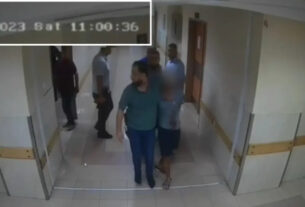A Health Ministry investigation committee has severely criticized the private Assuta Medical Center in Rishon Lezion for its mix-up of embryos last year that resulted in the mistaken insertion of an embryo into another woman instead of the biological mother. It also berated the ministry itself for poor supervision of in-vitro fertilization (IVF) units around the country.
“Assuta-Rishon Lezion has given life to thousands of children, created families and turned thousands of unhappy couples into happy ones. The committee is confident that the staff, doctors, nurses and embryologists, see their work as a mission and are attentive to the difficulties and hardships of the patients. Unfortunately, economic considerations were preferred over basic principles of maintaining the quality and safety of treatment. This preference turned the medical institution into an assembly line, derailed the cart and caused suffering and pain, not only to the patients who are in the first circle of the event, but to the community of patients and caregivers in Assuta and in all the IVF units in Israel,” ruled the investigation committee appointed by Dr. Boaz Lev, the ministry’s ombudsman for the medical professions and a former director-general.
In September last year, Lev ordered the establishment of a six-member inspection committee to examine the circumstances that caused the error during the IVF at Assuta Medical Center in Rishon Lezion, where the mix-up occurred. The woman who was pregnant with another couple’s embryo underwent dangerous surgery to try to save the fetus and after the birth, the baby had to have more operations. The woman who unintentionally served as a surrogate and her partner insisted that she keep the baby – who was named Sophia – and raise her as their own child, but other women who suspected they were the biological mother demanded to undergo genetic tests.
The Supreme Court recently overturned the decision of the Rishon Lezion Magistrates Court to appoint a guardian for the baby girl and allow other would-be parents to be tested genetically. Now the case is closed.
Lev also asked the committee chaired by Prof. Ami Fishman – a gynecologist and director of the system for quality, treatment safety and risk management at Rabin Medical Center in Petah Tikva – to formulate systemic conclusions and recommendations for improving the IVF treatment in Israel. They reviewed the medical data and all other relevant material and interviewed all who were involved in the case.
It was decided to reduce the IVF activity Assuta-Rishon Lezion by 50%.
The inspection committee met over 20 times and examined dozens of medical files of patients at the IVF unit.
What did the committee find about the Rishon Lezion Assuta IVF case?
The committee concluded that two couples had a high chance of being the baby’s genetic parents and that the exchange of embryos was done at the time of returning the embryo to the womb of the biological mother, between a patient who was supposed to enter first and a woman in labor, who entered the recovery room first. According to the committee, the source of the error is in the early preparation of the fertilized eggs, contrary to the acceptable practice. Later, a blunder in the identification of the patient who was waiting in the recovery room led, apparently, to the mix-up.
As for the second couple with a high chance of being the genetic parents, since this woman underwent a retrieval operation of ova at the same time as the retrievals performed for the mother and the first patient, and since the documentation of the schedule on the day of retrieval was completely confused, the possibility that the mistake in the retrieval of the embryos involves her as well cannot be ruled out, the committee said. The committee ranked this patient’s chance of being the genetic mother lower than that of the first patient, mainly due to the fact that this patient had only one embryo to return, while the first patient and the birth mother each had three embryos.
Until the date of submission of the current report, no test was performed to ascertain the genetic relationship of the couples who requested such a test and the baby. As long as a test is not performed to verify the genetic link, “we will not be able to know if the committee is correct in its probabilistic assessment regarding the two couples.”
It was likely that the mistake could have been discovered soon after the embryos were returned to the surrogate mother. The members of the committee said that it was not a single unfortunate mistake but a chain of errors that caused the embryos to be replaced.
“It is not possible to determine whether and which of the staff members who were involved in the mistake discovered it at some point. It is clear that the chain of errors did not result from the incorrect activity of just one staff member, since these are identification processes that must be carried out by several staff members and also lab work that require the involvement of two embryologists.”
The committee declared that the heavy workload at the private hospital was the source of the violation of the procedures and “skipping” necessary work steps according to these procedures. This also affected the performance of the patient-identification procedure during the operation of embryo retrieval, the removal of the fresh fertilized eggs of the first patient as well as the thawing of the frozen fertilized eggs of the mother and the second patient, which was performed the night before and was intended to save work time the next morning.
“The chain of alleged mistakes indicates very serious conduct by all involved, both at the level of execution and at the level of supervision and management,” the committee ruled.
“The chain of alleged mistakes indicates very serious conduct by all involved, both at the level of execution and at the level of supervision and management.”
Investigation committee
The committee found that from 2017 until the time of the incident, there was an increase of tens of percent in treatment cycles in the IVF unit there, without adjustment to the working conditions and the required status of the workforce. The significant increase in the scope of work was due to a regulation introduced by the ministry causing the diversion of female patients to treatment in the IVF units of private hospitals, including Assuta Medical Center in Rishon Lezion.
“Increasing the outputs in the IVF unit served the goals of the ministry and at the same time benefited Assuta and its doctors who were paid more. However, there was no proper adjustment of the mechanisms required to ensure the quality and safety of the treatment, when the economic consideration overshadowed the medical considerations.”
The committee found that sometimes, the economic aspect was a guiding factor in choosing the type of treatment, while using expensive techniques financed by the patients and that their benefit was not proven, such as the repeated use of IMSI – a sperm-selection method for returning embryos that are not suitable for return to the womb.
The committee noted that some doctors were overly involved in the professional decisions of the lab staff, like choosing the fertilization method that is not in accordance with the quality of the sperm and the fertilization rates in previous cycles, a decision to freeze embryos that are not suitable for freezing, returning embryos that are not of suitable quality for return and more.
Medical record management was deficient
In addition, medical record management in the IVF unit was deficient, the committee wrote.
“No care was taken to follow the procedures established in connection with the management of the medical record when these procedures also did not guarantee a required level of safety. Failure to adhere to the procedures in the patients’ medical records is part of a bad safety culture that reflects a deficiency of all those involved, both at the level of execution and at the level of supervision and management.”
“No care was taken to follow the procedures established in connection with the management of the medical record when these procedures also did not guarantee a required level of safety. Failure to adhere to the procedures in the patients’ medical records is part of a bad safety culture that reflects a deficiency of all those involved, both at the level of execution and at the level of supervision and management.”
Investigation committee
It appeared that Assuta’s treatment-safety-and risk-management unit was not involved in the work routine of the IVF unit. The committee asked several times for information or examples of the relationship between the IVF unit and Assuta’s risk management unit – such as the number of reports of “near misses” or “unusual events” in the years preceding the event or documentation of “safety rounds” by the unit’s management, but no such information was forthcoming.
In a meeting with a large part of the staff who appeared before the committee, the committee members got the impression that the hospital misrepresented what it had done and created a story that did not reflect the working conditions and organizational climate of the IVF unit in the period leading up to the event. “It was evident that they were trying to cover up and were not necessarily interested in being true partners in a thorough investigation of the circumstances of the difficult event.”
All of these point to a fundamental failure in the safety culture of the IVF unit. The failures were not limited to the work of this or that staff member in the unit. “The deviation from the procedures was not specific, and it would be a gross error to attribute the failures only to a certain staff member and to ignore the contribution of the system to this failure.”
The Health Ministry is also at fault
The committee criticized the ministry itself, declaring that its control tools in the period leading up to the incident “did not accurately reflect and were not able to reveal the failures in the unit’s safety culture and thus contributed to a false sense of security among the staff and management that ‘everything is fine,’ while the reality was far from that.”No comment has been received by Assuta Medical Centers or from its chairman, Prof. Yehoshua Shemer, who formerly was director-general of the Health Ministry, deputy director-general of Maccabi Health Services, and chief medical officer of the IDF and emeritus profession at Tel Aviv University’s Sackler Faculty of Medicine. In the 1990s, he designed and chaired the National Committee for Health Basket Services.




